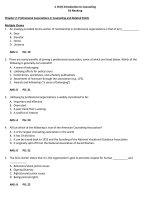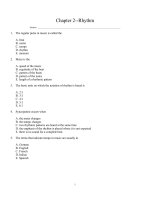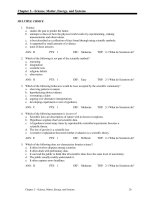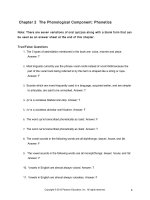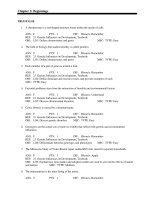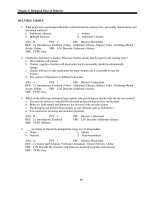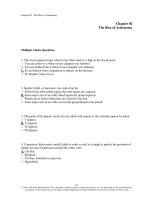Cengage advantage books introduction to sociology 11th edition tischler test bank
Bạn đang xem bản rút gọn của tài liệu. Xem và tải ngay bản đầy đủ của tài liệu tại đây (258.15 KB, 14 trang )
Chapter 2—Doing Sociology: Research Methods
MULTIPLE CHOICE
1. A variable is:
a. anything that can change.
b. a testable statement about the relationship between two or more hypotheses.
c. a factor that always remains constant.
d. a statement of association.
e. a fact given a definition in a research process.
ANS: A
MSC: Factual
REF: The Research Process
OBJ: 2.3
2. When two variables are related but one does not cause the other, researchers term the situation:
a. a validity.
b. an association.
c. a bias.
d. a reliability.
e. an establishment.
ANS: B
MSC: Factual
REF: The Research Process
OBJ: 2.2
3. Which of the following is a statement of causality?
a. Rural areas have fewer services than urban areas.
b. This sociology course is difficult.
c. Poverty produces low self-esteem.
d. Mean income in New York is higher than mean income in Florida.
e. On average, more persons are murdered in Texas than Arizona.
ANS: C
MSC: Conceptual
REF: The Research Process
OBJ: 2.1
4. "Cigarette smoking has been shown to be related to lung disease." This proposition includes:
a. a statement of bias against smoking.
b. a statement of association.
c. no independent variable.
d. all of the above
e. none of the above
ANS: B
MSC: Conceptual
REF: The Research Process
OBJ: 2.1
5. On average, the taller a person is, the more she or he is likely to weigh. The evidence for this statement
would most likely be:
a. a statement causality.
b. random insight.
c. an examination of the first ten persons walking into a classroom in a non-biased way.
d. a statement of association.
e. a firm biological relationship.
ANS: D
MSC: Applied
REF: The Research Process
OBJ: 2.1
6. "Social class background is a good predictor of achievement in school." In this statement, achievement
in school is the:
a. independent variable.
b. dependent variable.
c. significant variable.
d. control variable.
ANS: B
MSC: Applied
REF: The Research Process
OBJ: 2.3
7. "Men who live in cities are more likely to marry young than men who live in the country." In this
hypothesis, the dependent variable is the:
a. place of residence (city or country).
b. marital status (single or married).
c. age at marriage.
d. sex.
e. There is no dependent variable in this example.
ANS: B
MSC: Applied
REF: The Research Process
OBJ: 2.3
8. In a recent national survey, it was learned that the grade point average of college seniors was
correlated with their class attendance. In that study, the independent variable was:
a. class attendance.
b. class rank, e.g., senior status.
c. grade point average.
d. the national survey.
ANS: A
MSC: Applied
REF: The Research Process
OBJ: 2.3
9. Using a structured interview:
a. might allow useful information to be ignored or lost.
b. guarantees that useful information will not be lost.
c. guarantees that researchers' bias will not affect the study.
d. provides results that are valid.
e. provides the only true method of achieving reliability.
ANS: A
MSC: Applied
REF: The Research Process
OBJ: 2.2
10. In what type of interview does the investigator ask a list of questions, but is free to vary them or make
up new questions on topics that take on importance during the course of the interview?
a. a structured interview
b. an open-ended interview
c. an invalid experiment
d. a participant observation
e. subject to interviewer bias
ANS: B
MSC: Applied
REF: The Research Process
OBJ: 2.2
11. A major drawback of open-ended interviews is that:
a. some interviews may not cover topics important to the research project.
b.
c.
d.
e.
information obtained will be somewhat different for each subject, and therefore unreliable.
researchers continuously have to make up new questions.
analysis of the information is a complex and time-consuming process.
respondents do not like open-ended interviews.
ANS: D
MSC: Conceptual
REF: The Research Process
OBJ: 2.2
12. Riding in unmarked police cars to collect data on drug dealers is using:
a. a longitudinal survey.
b. a laboratory experiment.
c. participant observation.
d. a semi-structured interview.
e. secondary observation.
ANS: C
MSC: Applied
REF: The Research Process
OBJ: 2.2
13. In the early 1960s, sociologist Herbert Gans moved into a newly developed suburb in New Jersey
where he lived for two years, observing and interviewing his neighbors. In research terms, Gans
conducted a _____ study.
a. documentary
b. experimental
c. survey
d. participant observation
e. secondary analysis
ANS: D
MSC: Factual
REF: The Research Process
OBJ: 2.2
14. Sociologists utilizing the Census, the FBI statistics, or statistics from the Department of Labor would
be engaged in which type of data collection method?
a. participant observation
b. survey research
c. experiments
d. secondary analysis
ANS: D
MSC: Factual
REF: The Research Process
OBJ: 2.2
15. Bob grew up in the church, where he proposed to study ethics in church finance. He found it difficult
to say anything negative or critical about the people who were part of his community, even when he
discovered some financial manipulations by members of the congregation. Which of the following is a
potential problem in this study?
a. a high degree of subject object conflict
b. unintentional bias created by the emotional attachment of the researcher to subjects
c. a frequent inability to get at the subtleties and nuances of social interaction
d. differences between generations in experience
e. Selecting what to report as significant is normal, so there is no problem.
ANS: B
OBJ: 2.5
REF: Objectivity in Sociological Research
MSC: Applied
16. Which of the following research designs is least used by sociologists?
a. survey research
b.
c.
d.
e.
participant observation
controlled experiment
structured interview
secondary analysis
ANS: C
MSC: Factual
REF: The Research Process
OBJ: 2.2
17. The main advantage of experiments in social research is that:
a. people tend to act more naturally in laboratory settings.
b. researchers have control over the variables of the study.
c. interactions of large groups can easily be studied.
d. it is the least expensive form of research design.
e. subjects respond most honestly.
ANS: B
MSC: Factual
REF: The Research Process
OBJ: 2.2
18. In research, a sample is defined as:
a. all the people who share a particular characteristic of research interest.
b. two or more people who share the same values.
c. the portion of the total population chosen for study.
d. the one case or person that best represents a particular social category.
e. a small group of volunteers for the study.
ANS: C
MSC: Factual
REF: The Research Process
OBJ: 2.4
19. Failure to achieve a representative sample is known as:
a. researcher bias.
b. sampling error.
c. subjectivity.
d. stratified sampling.
e. all of the above
ANS: B
MSC: Factual
REF: The Research Process
OBJ: 2.4
20. People are selected from a group in such a way that every person has the same chance of being
selected. The people who are selected make up what type of sample?
a. representative
b. random
c. stratified
d. cross-sectional
e. unintentional
ANS: B
MSC: Conceptual
REF: The Research Process
OBJ: 2.4
21. Select the appropriate group to create a stratified random sample of students at your school.
a. 300 students selected at random
b. all the low-income students enrolled in the college
c. all racial and religious groups represented in proportion to their numbers at the college
d. every fifth student selected from an alphabetical listing of names
e. blind picking of students standing outside of a student union building
ANS: C
MSC: Applied
REF: The Research Process
OBJ: 2.4
22. In a research study, investigators at one of the study sites are not told what is actually being tested, nor
are they told who the research subjects are. This is an example of:
a. double-blind technique.
b. random sampling.
c. poor research design.
d. biased research techniques.
e. a controlled experiment.
ANS: A
MSC: Conceptual
REF: The Research Process
OBJ: 2.5
23. The use of blind or double-blind investigators in a study is done to avoid:
a. sampling error.
b. sample bias.
c. uncontrollable variables.
d. researcher bias.
e. random error.
ANS: D
MSC: Factual
REF: The Research Process
OBJ: 2.5
24. The midway point in a series of scores or figures resulting in half of the scores being above and half
being below is called the:
a. mean.
b. median.
c. mode.
d. meridian.
e. moderate.
ANS: B
MSC: Factual
REF: The Research Process
OBJ: 2.6
25. Find the mode of the following quiz scores: 92, 84, 76, 92, 87, 100.
a. 84
b. 87
c. 76
d. 92
e. 100
ANS: D
MSC: Applied
REF: The Research Process
OBJ: 2.6
26. Find the mode of the following quiz scores: 45, 77, 65, 67, 51, 98, 51, 77, 79, 69, 86, 83, 77, 99, 98,
54, 68, 77, 93, 94, 72, 77.
a. 68
b. 77
c. 68.5
d. 72
e. 79.4
ANS: B
MSC: Applied
REF: The Research Process
OBJ: 2.6
27. Find the mean of the following quiz scores: 12, 24, 36, 47, 57, 100.
a. 24
b. 100
c. 46
d. 87
e. 57
ANS: C
MSC: Applied
REF: The Research Process
OBJ: 2.6
28. Find the median of the following quiz scores: 14, 5, 5, 4, 4, 18, 12, 7, 14, 10, 6.
a. 5
b. 7
c. 10
d. 14
e. 18
ANS: A
MSC: Applied
REF: The Research Process
OBJ: 2.6
29. This measure of central tendency is commonly referred to as the average.
a. median
b. mode
c. mean
d. mentor
e. merit
ANS: C
REF: 39
OBJ: 2.6
MSC: Factual
30. Which measure of central tendency is most useful when there is a relatively narrow range of figures?
a. median
b. mode
c. mean
d. mentor
e. merit
ANS: C
MSC: Conceptual
REF: The Research Process
OBJ: 2.6
31. You are reading a statistical table. What part of that table would help you make a decision as to the
reliability of the table's information?
a. source
b. title
c. footnotes
d. column and row labels
e. publication date
ANS: A
MSC: Conceptual
REF: The Research Process
OBJ: 2.7
32. Knowing the source of the information in a statistical table can help you:
a. identify other references of the same data.
b. determine if the data collection agent had a background in sociology.
c. determine of the data has been previously used elsewhere.
d. determine other ways to collect the same data.
e. decide if the information is reliable.
ANS: E
MSC: Conceptual
REF: The Research Process
OBJ: 2.7
33. What type of research did Emile Durkheim depend on in his classic study on suicide?
a. primary research
b. public research
c. qualitative research
d. secondary research
e. Durkheim did analysis, not research.
ANS: D
MSC: Factual
REF: The Research Process
OBJ: 2.2
34. _____ refers to consistency of results in research; _____ refers to the appropriateness of a measure to
the phenomenon being studied.
a. Reliability; validity
b. Validity; reliability
c. Representative; validity
d. Reliability; objectivity
e. Neutrality; validity
ANS: A
MSC: Factual
REF: The Research Process
OBJ: 2.2
35. Validity refers to:
a. the quality of consistency in measurement.
b. the extent to which the researcher measured what she had planned to measure.
c. the manner in which the researcher has operationalizing variables.
d. the sum of independent and dependent variables.
e. the lack of researcher bias which can be demonstrated statistically.
ANS: B
MSC: Factual
REF: The Research Process
OBJ: 2.2
36. You just read a study which reports that marijuana use leads to heroin addiction. After a careful
examination of the literature, you are unable to find any other researcher who has been able to
duplicate these results. You may conclude that this study lacks:
a. reliability.
b. representation.
c. cohesiveness.
d. validity.
e. legality.
ANS: A
MSC: Applied
REF: The Research Process
OBJ: 2.2
37. Max Weber argued that sociologists need to:
a. become more personally involved in their research.
b. rely on their morals to decide which scientific findings should be accepted as true.
c. clearly state their personal values before beginning their research study.
d. refrain from including their personal values into the research process.
e. take on research for those social causes for which they are certain to help society's
powerless persons who have no other spokesperson.
ANS: D
OBJ: 2.5
REF: Objectivity in Sociological Research
MSC: Factual
38. You would like to do a study of household size among the population of the state of Illinois. Which
type of study method would be appropriate?
a. unstructured interviews
b. cross-sectional study
c. longitudinal study
d. scientific experiment
e. participant observation
ANS: B
MSC: Applied
REF: The Research Process
OBJ: 1.2
39. Objectivity requires a social researcher to:
a. assume a completely neutral stance toward the issue under investigation.
b. recognize and attempt to control for bias.
c. manipulate the research subjects as if they were inanimate objects.
d. disguise any personal bias that they might have.
e. sign statements agreeing to remove all personal bias from their research.
ANS: B
MSC: Conceptual
REF: The Research Process
OBJ: 2.9
40. You just proved a research hypothesis false. As a sociologist, how should you treat this?
a. When a hypothesis is false, you should double check your sample for errors.
b. Hypothesis testing is flawed by nature, so you should try again until things fit.
c. False hypotheses are rare, so this finding is itself worth keeping.
d. Proving a hypothesis false helps to eliminate wrong answers and clarify research.
e. A hypothesis that is false in one sense may be true in another.
ANS: D
MSC: Applied
REF: The Research Process
OBJ: 2.2
41. Ethical considerations that must be part of a sociologist's research include:
a. striving to protect the rights and privacy of participants.
b. promising anonymity to investigators.
c. ensuring that participants accept all findings.
d. ensuring that results will support the hypothesis.
e. promising to present all theoretical ideas on a subject.
ANS: A
OBJ: 2.9
REF: Ethical Issues in Sociological Research
MSC: Factual
42. It is clear that a large survey is an appropriate method for a study of marriage patterns among college
students. What will the researcher need to do to insure that the research sample is random?
a. Ask as many people as possible.
b. Ask more than one group of people; try to get all the groups in.
c. Set up the experiment to include a control sample to test the research sample.
d. Distribute the surveys in a non-biased manner.
e. Make sure that everyone eligible to participate has an equal chance of being selected.
ANS: E
MSC: Applied
REF: The Research Process
OBJ: 2.4
43. Social scientists regard deception of research participants as:
a. unimportant unless the research participant protests.
b. only an issue if the participants are children.
c. a practice to avoid if at all possible.
d. nothing to worry about.
e. only an issue if the participants are senior citizens.
ANS: C
OBJ: 2.9
REF: Ethical Issues in Sociological Research
MSC: Factual
44. A survey of employed women must include people of different ages. To make sure the results of such
a survey are representative of all employed women in the society, you should use which of the
following?
a. a stratified sample
b. longitudinal data
c. interviews with union and non-union employees
d. a sample based on high school placement records
e. a pure random sample
ANS: A
MSC: Applied
REF: The Research Process
OBJ: 2.4
45. Which of the following represents an advantage of social surveys?
a. There is often a low response rate.
b. The laboratory setting creates an artificial social environment.
c. Findings are open to interpretation and can support researcher bias.
d. Data can be quantified and comparisons between groups can be made.
e. There is no likelihood of flawed data.
ANS: D
MSC: Conceptual
REF: The Research Process
OBJ: 2.2
46. A student decided to experiment with what happens when normal expectations are broken. He took
some items from another person’s basket and counted them on the floor. He then wrote down how the
other person responded. What is the student’s method of finding data?
a. questionnaire distributed after the research act
b. observation
c. action research
d. scientific small experiment
e. controlled experiment
ANS: B
MSC: Applied
REF: The Research Process
OBJ: 2.2
47. Which of the following represents an advantage of participant observation research?
a. Questionnaires can be used for large numbers of people.
b. It is easy to replicate.
c. Data can be quantified and comparisons made.
d. It allows people to be observed in their “natural” environments.
e. There is no likelihood of flawed data.
ANS: D
MSC: Factual
REF: The Research Process
OBJ: 2.2
48. Which of the following represents an advantage of a secondary analysis?
a. Questionnaires can be used for large numbers of people.
b. The laboratory creates an artificial social environment.
c. It is time-consuming
d. It saves time and money.
e. There is no likelihood of flawed data.
ANS: D
MSC: Factual
REF: The Research Process
OBJ: 2.2
49. Dr. Tom is doing research about the vampire in American society. What is the first problem he must
solve before he selects a research design method?
a. People have such strong reactions to vampires that an objective index will be hard to
write.
b. Vampires do not exist, so how can this be an empirical study?
c. Can a big enough selection of cases related to vampires be identified for research?
d. How many variables are related to vampires?
e. What is the operational definition of a vampire in this research?
ANS: E
MSC: Applied
REF: The Research Process
OBJ: 2.1
50. Searching for the definition of love by comparing cultural definitions helps to:
a. prevent people from giving false information or the wrong answer.
b. point the way to the proper sample of lovers for study.
c. create multiple categories of definitions of the term love that can fit in one study.
d. call into question whether love actually exists.
e. establish an empirical definition for research.
ANS: E
MSC: Applied
REF: The Research Process
OBJ: 2.1
TRUE/FALSE
1. Longitudinal research investigates characteristics of a population over time.
ANS: T
MSC: Conceptual
REF: The Research Process
OBJ: 2.1
2. Secondary data analysis is used when the researcher has collected data for the second time.
ANS: F
MSC: Factual
REF: The Research Process
OBJ: 2.2
3. The researcher engaged in secondary data analysis may use the same data for a new study and a
different purpose.
ANS: T
MSC: Factual
REF: The Research Process
OBJ: 2.2
4. The first step in the research process is to develop one or more hypotheses.
ANS: F
MSC: Factual
REF: The Research Process
OBJ: 2.1
5. Random sampling is a technique where a random number of people are selected from any size group
by a researcher in a particular geographic location.
ANS: F
MSC: Conceptual
REF: The Research Process
OBJ: 2.4
6. Independent and dependent variables are found in statements of causality; however, they are not
necessary for statements of association.
ANS: F
MSC: Conceptual
REF: The Research Process
OBJ: 2.3
7. A dependent variable changes in response to changes in the independent variable.
ANS: T
MSC: Factual
REF: The Research Process
OBJ: 2.3
8. In the hypothesis "poverty produces low self-esteem," poverty is the dependent variable.
ANS: F
MSC: Applied
REF: The Research Process
OBJ: 2.3
9. Researcher bias is the tendency to select data that supports the researcher’s hypothesis.
ANS: T
OBJ: 2.8
REF: Objectivity in Sociological Research
MSC: Factual
10. An open-ended interview is often more flexible than other forms of survey data because the format can
be varied, changed, or modified while it is in progress.
ANS: T
MSC: Conceptual
REF: The Research Process
OBJ: 2.2
11. Internet researchers do not need to follow the same guidelines for protecting human subjects because
everything is virtual.
ANS: F
OBJ: 2.9
REF: Ethical Issues in Sociological Research
MSC: Factual
12. Participant observers attempt to get to know as much as possible about all members of the group being
studied.
ANS: T
MSC: Conceptual
REF: The Research Process
OBJ: 2.2
13. Representative samples have strong advantages over many other forms of sampling in allowing
researchers to generalize their findings to larger populations of people they are studying.
ANS: T
MSC: Conceptual
REF: The Research Process
OBJ: 2.4
14. The way to ensure that a sample is representative of the population being studied is to try to
incorporate as many members of the population as possible.
ANS: F
MSC: Conceptual
REF: The Sociological Process
OBJ: 2.4
15. In a random sample, every element sampled has an equal chance of being either selected or not
selected.
ANS: T
MSC: Factual
REF: The Research Process
OBJ: 2.4
16. The ethical research guidelines regulate Internet-based surveys because they are so popular.
ANS: F
OBJ: 2.9
REF: Ethical Issues in Sociological Research
MSC: Applied
17. Blind investigations are a standard method for dealing with researcher bias.
ANS: T
MSC: Conceptual
REF: The Research Process
OBJ: 2.2
18. After starting a research project and gaining consent from your subjects, you discover that the machine
you are using to project social party sounds for interpretation can damage the subjects’ hearing. You
must stop the study right away.
ANS: T
OBJ: 2.9
REF: Ethical Issues in Sociological Research
MSC: Applied
19. If only information that supports the research hypothesis is published, researcher bias has occurred.
ANS: T
OBJ: 2.8
REF: Objectivity in Sociological Research
MSC: Conceptual
20. During a double-blind investigation, both the investigators and their subjects are unaware of the
hypothesis being tested.
ANS: T
MSC: Factual
REF: The Research Process
OBJ: 2.2
21. The mean, or average, becomes a valuable measure of central tendency when the data include extreme
figures or scores.
ANS: F
MSC: Conceptual
REF: The Research Process
OBJ: 2.6
22. The median is the number that occurs most often in a data set.
ANS: F
MSC: Factual
REF: The Research Process
OBJ: 2.6
23. The mode is the number that occurs most often in a data set.
ANS: T
MSC: Factual
REF: The Research Process
OBJ: 2.2
24. A discovery made by accident and not accounted for in the original research design must be placed
aside and not reported. This protects the integrity of the original design.
ANS: F
OBJ: 2.8
REF: Objectivity in Sociological Research
MSC: Applied
25. Row and column labels tell you exactly what information is contained in a table.
ANS: T
MSC: Factual
REF: The Research Process
OBJ: 2.7
26. It is acceptable to hide the purpose of your study from potential subjects if they will give you more
information that way.
ANS: F
OBJ: 2.9
REF: Ethical Issues in Sociological Research
MSC: Conceptual
27. Research is reliable when the same technique produces the same results on a consistent basis.
ANS: T
REF: 42
OBJ: 2.2
MSC: Conceptual
28. Current federal regulations require that social researchers obtain informed consent from people who
volunteer to be part of a research project.
ANS: T
OBJ: 2.9
REF: Ethical Issues in Sociological Research
MSC: Factual
29. Once informed consent is given, a volunteer subject cannot withdraw from the study.
ANS: F
OBJ: 2.9
REF: Ethical Issues in Sociological Research
MSC: Factual
30. Secondary analysis cannot be used as the basis for a longitudinal study.
ANS: F
MSC: Factual
REF: The Research Process
OBJ: 2.2
31. Secondary analysis is appropriate for contemporary investigations; however, it is almost useless for
collecting historical or longitudinal data.
ANS: F
MSC: Applied
REF: The Research Process
OBJ: 2.2
32. Earlier research studies that did not follow the regulations to protect human subjects may have
documented important findings, but these studies cannot be repeated.
ANS: T
OBJ: 2.9
REF: Ethical Issues in Sociological Research
MSC: Factual
33. The protection of human subjects is an ethical ideal that we can strive for but never achieve.
ANS: F
OBJ: 2.9
REF: Ethical Issues in Sociological Research
MSC: Factual
ESSAY
1. Outline and discuss the seven basic steps in the research process.
ANS:
Not Provided
REF: The Research Process
OBJ: 2.1
MSC: Factual
2. Outline and discuss the four major categories of research methods. Discuss the major strengths and
weaknesses of each.
ANS:
Not Provided
REF: The Research Process
OBJ: 2.2
MSC: Factual
3. Outline and discuss the steps to follow in reading and interpreting a table in a research study.
ANS:
Not Provided
REF: The Research Process
OBJ: 2.7
MSC: Factual
4. Using your reading as a guide, write a question about a possible relationship between two research
variables. Define the independent and dependent variables. What is the possible relationship between
the two?
ANS:
Not Provided
REF: The Research Process
OBJ: 2.3
MSC: Applied
5. Outline the three regulations for the protection of human subjects prescribed by the federal
government and discuss how each regulation contributes to protection of individuals in groups.
ANS:
Not Provided
REF: Ethical Issues in Sociological Research
MSC: Applied
OBJ: 2.9
6. Describe a group or issue you are interested in investigating. Which research methods would be
appropriate to use in your study of the group? How would you select or identify people as participants
for your study? Be sure you identify the level and type of methods, and why the strengths and
weaknesses of each method make sense as a best choice for your study.
ANS:
Not Provided.
REF: The Research Process
OBJ: 2.2
MSC: Applied
